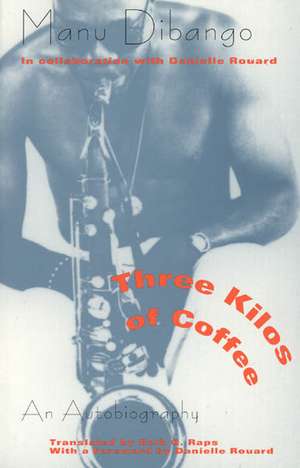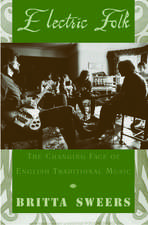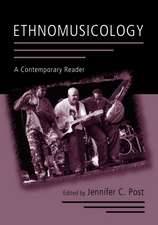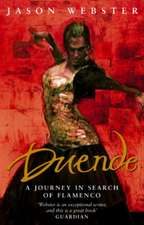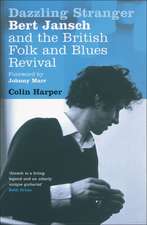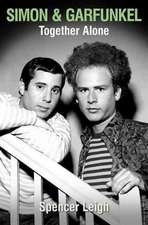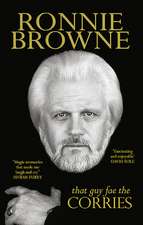Three Kilos of Coffee: An Autobiography
Autor Manu Dibango Traducere de Beth G. Raps Autor Danielle Rouarden Limba Engleză Paperback – 30 iun 1994
In 1948, at the age of fifteen, Manu Dibango left Africa for France, bearing three kilos of coffee for his adopted family and little else. This book chronicles Manu Dibango's remarkable rise from his birth in Douala, Cameroon, to his worldwide success—with Soul Makossa in 1972—as the first African musician ever to record a top 40s hit.
Composer, producer, performer, film score writer and humanitarian for the poor, Manu Dibango defines the "African sound" of modern world music. He has worked with and influenced such artists as Art Blakey, Don Cherry, Herbie Hancock, Harry Belafonte, Paul Simon, and Johnny Clegg. In Africa, he has helped younger musicians, performed benefit concerts, and transcribed for the first time the scores and lyrics of African musicians.
The product of a "mixed marriage" (of different tribes and religions) who owes allegiances to both Africa and Europe, Dibango has always been aware of the ambiguities of his identity. This awareness has informed all of the important events of his life, from his marriage to a white Frenchwoman in 1957, to his creation of an "Afro-music" which joyfully blends blues, jazz, reggae, traditional European and African serenades, highlife, Caribbean and Arabic music. This music addresses the meaning of "Africanness" and what it means to be a Black artist and citizen of the world.
This lively and thoughtful memoir is based on an extensive set of interviews in 1989 with French journalist Danielle Rouard. Richly illustrated with photographs, this book will be a must for readers of jazz biographies, students of African music and ethnomusicology, and all those who are lovers of Manu Dibango's unique artistry and accomplishments.
Composer, producer, performer, film score writer and humanitarian for the poor, Manu Dibango defines the "African sound" of modern world music. He has worked with and influenced such artists as Art Blakey, Don Cherry, Herbie Hancock, Harry Belafonte, Paul Simon, and Johnny Clegg. In Africa, he has helped younger musicians, performed benefit concerts, and transcribed for the first time the scores and lyrics of African musicians.
The product of a "mixed marriage" (of different tribes and religions) who owes allegiances to both Africa and Europe, Dibango has always been aware of the ambiguities of his identity. This awareness has informed all of the important events of his life, from his marriage to a white Frenchwoman in 1957, to his creation of an "Afro-music" which joyfully blends blues, jazz, reggae, traditional European and African serenades, highlife, Caribbean and Arabic music. This music addresses the meaning of "Africanness" and what it means to be a Black artist and citizen of the world.
This lively and thoughtful memoir is based on an extensive set of interviews in 1989 with French journalist Danielle Rouard. Richly illustrated with photographs, this book will be a must for readers of jazz biographies, students of African music and ethnomusicology, and all those who are lovers of Manu Dibango's unique artistry and accomplishments.
Preț: 203.01 lei
Nou
Puncte Express: 305
Preț estimativ în valută:
38.85€ • 40.41$ • 32.07£
38.85€ • 40.41$ • 32.07£
Carte tipărită la comandă
Livrare economică 14-28 aprilie
Preluare comenzi: 021 569.72.76
Specificații
ISBN-13: 9780226144900
ISBN-10: 0226144909
Pagini: 158
Ilustrații: 44 halftones
Dimensiuni: 140 x 216 x 15 mm
Greutate: 0.26 kg
Ediția:1
Editura: University of Chicago Press
Colecția University of Chicago Press
ISBN-10: 0226144909
Pagini: 158
Ilustrații: 44 halftones
Dimensiuni: 140 x 216 x 15 mm
Greutate: 0.26 kg
Ediția:1
Editura: University of Chicago Press
Colecția University of Chicago Press
Notă biografică
Born in Cameroon, Manu Dibango (1933–2020) was a trailblazing saxophonist who long lived in Paris with his family. Danielle Rouard is a journalist who has written for Le Monde.
Cuprins
Foreword by Danielle Rouard
Nimele Bolo
Really the Blues
"Indépendance Cha-Cha"
African Jazz
The Tam-Tam of Léopoldville
Neighborhood Business
Soul Party
I'd Like to Be a Black Man
"Idiba"
"Soul Makossa"
Agouti and Foutou: Of Field Rats and Fufu
"Douala Sérénade"
"Tam-Tam pour L'Ethiopie"
Black Resonance
"Sonacotra Blues"
Honors and Distinctions
Discography
Index
Nimele Bolo
Really the Blues
"Indépendance Cha-Cha"
African Jazz
The Tam-Tam of Léopoldville
Neighborhood Business
Soul Party
I'd Like to Be a Black Man
"Idiba"
"Soul Makossa"
Agouti and Foutou: Of Field Rats and Fufu
"Douala Sérénade"
"Tam-Tam pour L'Ethiopie"
Black Resonance
"Sonacotra Blues"
Honors and Distinctions
Discography
Index
Recenzii
“Popular African jazz saxophonist Dibango ('Soul Makossa'; 'Electric Africa') details his life in the musical spotlight, beginning with his 1948 emigration from Cameroon to France, at age fifteen. Young Dibango picked up jazz and blues music quickly—learning piano as well as saxophone—but lost his traditional family's approval when word got back to Cameroon of his success as a working musician. Despite his eventual climb to international fame, familial and tribal conflict haunted Dibango. . . . That Dibango beat these formidable odds to make a career out of his music is a testament to his strong spirit, one which permeates this autobiography. . . . ‘In music there's no past and no future, just the present,’ Dibango notes, and that is how he has chosen to tell his life story.”
“Dibango is a jazz saxophonist with an international reputation. His song ‘Soul Makossa’ is sometimes credited with being the first disco tune. Dibango was born in Cameroon in 1933. At the age of fifteen he left the country for a boarding school in France. His father gave him a small amount of money and three kilos of coffee to pay for his first school term. The boy grew up, established himself as a professional musician in Brussels and Paris, then spent many years trying to return to Africa. His memoir Three Kilos of Coffee . . . is largely the story of how hard going home can be.”
“Three Kilos of Coffee is full of information and beautiful observations. Manu Dibango comes across as worthy of his reputation. He is straightforward, modest, honest, articulate, and generous. The book is a great read. It is also an important document about a leader of the Third World, about music, and about culture. I was excited while I read it.”
